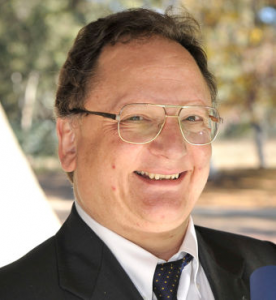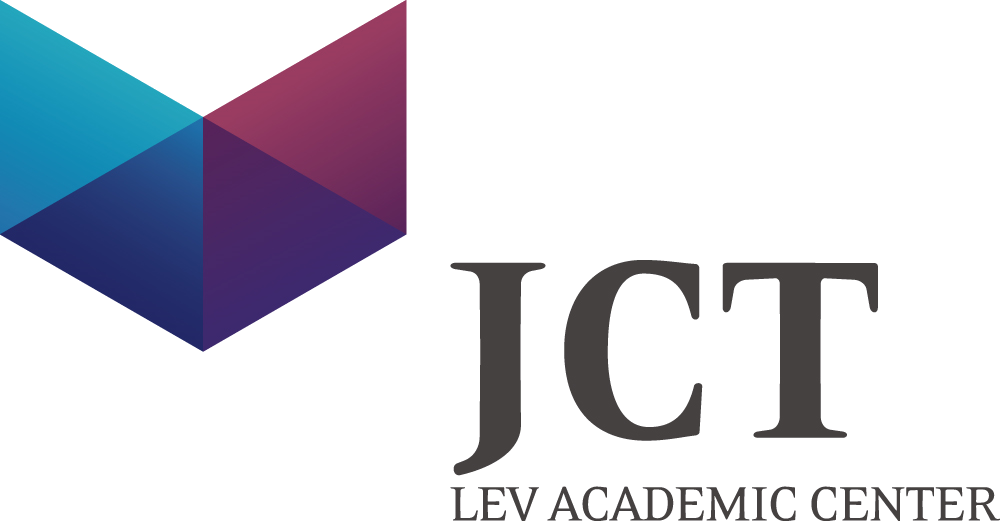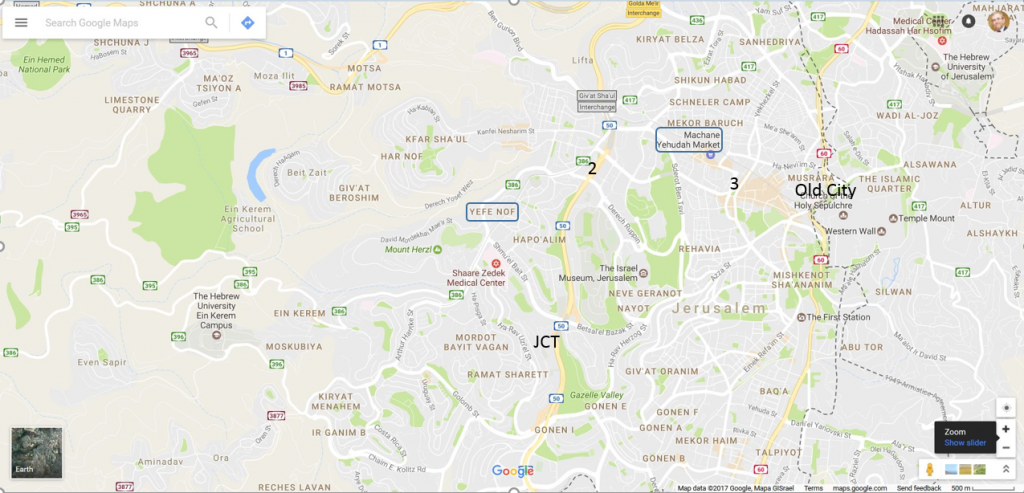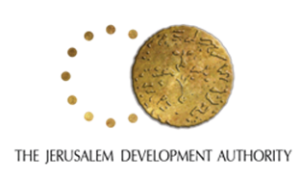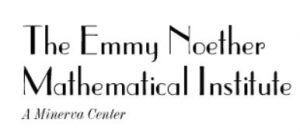ACA 2017
23rd Conference on Applications of Computer Algebra
Jerusalem, July 17-21, 2017
Commemorating the heritage of Jonathan Michael Borwein

Panorama of Jerusalem Old City and Temple Mount, Israel
Welcome to the site of ACA 2017!
The ACA conference series is devoted to promoting all kinds of computer algebra applications, and encouraging the interaction of developers of computer algebra systems and packages with researchers and users (including scientists, engineers, educators, and mathematicians).
Topics include, but are not limited to, computer algebra in the sciences, engineering, communication, medicine, pure and applied mathematics, education and computer science.
Contact: aca2017@jct.ac.il
Only a few days to go and we will be together here for the wonderful 23rd ACA conference!
The schedule is here and the book of abstracts (pdf file) is here.
Have a nice trip to Israel.
ACA 2017 will take place on the Lev campus of the Jerusalem College of Technology (JCT).
JCT is an institution of Higher Education devoted mainly to High Tech (Computer Science, Telecommunications, Electro-optics, Electronics, etc.), Management and Health). The department of Mathematics provides courses to all the other departments, so does the department of CS besides its own curriculum. Students @ JCT learn towards B.SC and M.Sc. in these different fields.
Researchers are active in numerous scientific fields and collaborate with researchers in Israel and overseas, both at universities and in industry.
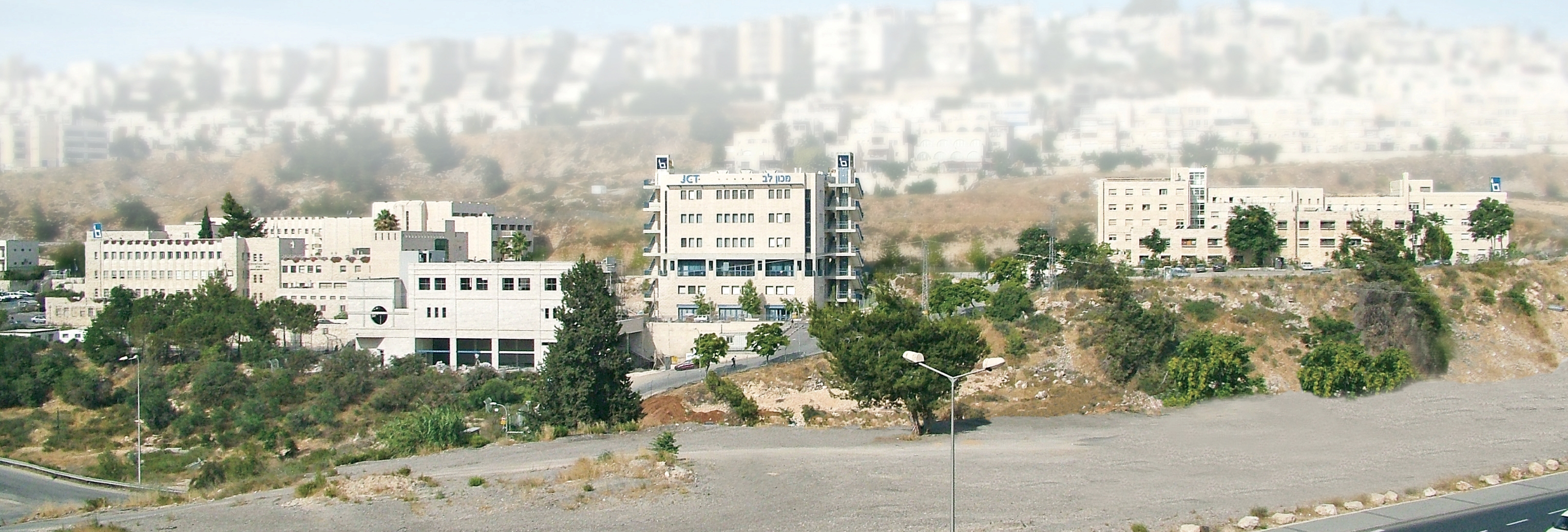
General Chairs |
Thierry Dana-Picard, Jerusalem College of TechnologyIlias Kotsireas, Wilfrid Laurier University, Canada |
|
Advisory Committee: |
Stanly Steinberg - Albuquerque, USAEugenio Roanes-Lozano, Univ. Complutense de Madrid, Spain |
|
Michael Wester - Albuquerque, USA |
||
Scientific Committee: |
ACA working group |
|
Local organizing committee |
Thierry Dana-Picard, Ivy Kidron, Meir Komar, Jacob Koletker, Aharon Naiman, Yossi Peretz, Moti Reiff - (JCT, Math Dpt and CS Dpt - aca2017-organizers@jct.ac.il) |
INVITED SPEAKERS (KEYNOTES):
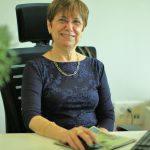
Sara Hershkovitz, Center for Educational Technology, Tel Aviv. Short bio
Enhancing Teachers' and Students' Mathematical Knowledge in a Technology-Rich Environment
In the last century, the main goals of mathematics education were based on conceptual understanding, problem solving and problem posing, modeling, application, reasoning, creativity, and critical thinking. These goals became possible with the development of technological tools (which had previously not existed) that could carry out the procedures. The integration of digital technology into the mathematics classroom is an ongoing process which has also created an ability to focus teaching and learning processes on important ideas in mathematics. Today, with the aid of the new technologies, it is possible to develop learning approaches that include the use of representations, research into mathematical phenomena through dynamic technological applications, and feedback from the computer through mirroring of the outcome of the student’s action ("intellectual mirroring").
The feedback allows the student to solve problems, to research and test different alternatives and decide whether he has achieved what he set out to do, and, by testing , to generalize ideas and phenomena. Feedback is changed from a confirmation of prior knowledge – feed back – to the new knowledge – feed forward[1].
In addition, on the one hand, the technology facilitates the assembly of rich content to develop the required concepts and ideas, together with the disciplinary goals and learning skills. On the other hand it allows the students’ learning abilities to be checked and analyzed using analytical tools applied to big data, collected and analyzed on an ongoing basis. Based on these data, teaching and learning processes appropriate to each student can be constructed. These new possibilities carry with them new ways of content development for all educational stages, and new methods for teacher development.
In the presentation mathematics instruction will be presented and discussed as interaction of teachers, students, and content in technological learning environments.
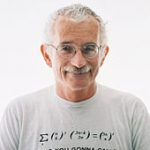
Doron Zeilberger, Rutgers University. Personal page
Jonathan Borwein: a PiONEER of Experimental Mathematics
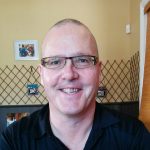
Rob Corless, Western University, London, ON (Canada). Short bio
Gamma and Factorial in the Monthly
Since its inception in the 19th century, the American Mathematical Monthly has published over fifty papers on the Gamma function or equivalently the factorial function. Over half of these were on Stirling’s formula. We survey these papers, which include a Chauvenet prizewinning paper by Philip J. Davis and a paper by the Fields medallist Manjul Bhargava, and highlight some features in common. We also identify some surprising gaps and attempt to fill them, especially on the “inverse Gamma function”.
This is joint work with the late Jonathan M. Borwein.
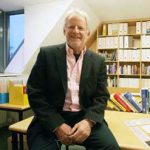
Bruno Buchberger, RISC, Johannes Kepler University, Linz, Austria
Teaching Math to Lady M
I stopped teaching logic and math to humans. Instead I started to teach logic / math to Lady M, a machine. She (or he or it) has absolutely no insight and I enjoy that she does not expect that what I am telling her has any meaning (semantics). For certain input expressions she produces certain output. Very reliably, for the same input the same output. By certain input, her inner state changes and she her input / output behavior changes. Recently, after many layers of communication, I managed to make her behave the way I behaved when, as a PhD student, I invented the Gr\" obner bases algorithm. I.e. I taught her to invent mathematical algorithms and proofs. Of course, she does not know. Of course, I cannot give a talk on this, since I stopped talking to mathematicians. However, if you like and you don't make me jealous, you may come and watch me talk to Lady M.
Stephen Watt, University of Waterloo, ON, Canada
Computer Algebra in Online STEM Education
Maplesoft and the Faculty of Mathematics at the University of Waterloo have recently entered into a collaboration to produce a stream of online STEM courses based on the Möbius platform. The Faculty of Mathematics already offers one completely online degree, the Master of Mathematics for Teachers, as well as online sections of many core courses. The Möbius platform is now being used to enhance the interactivity of online course assets and to allow fine-grained student evaluation. The present talk describes the main issues in developing the new online degrees.
Alfred Inselberg, School of Mathematical Sciences, Tel Aviv University, Israel
FEATURED PRESENTATIONS BY SPONSORS:
Maplesoft:
Omer Yagel, VP DigiSec, Israeli rep. of Maplesoft
Free Students' Exercise Notebooks and Maple 2017 News
Wolfram:
Erez Kaminski: New in the Wolfram Language - making Machine Learning and other modern computing disciplines easy to use
Participants
| Name | Institution | Country | |
| 1. | Bruno Buchberger | Johannes Kepler University, Linz | Austria |
| 2. | Doron Zeilberger | Rutgers University, New Brunswick, NJ | USA |
| 3. | Gershon Elber | CS, Technion, Haifa | Israel |
| 4. | Haiduke Sarafian | University College, Penn State U., PA | USA |
| 5. | Haohao Wang | Math Dpt, Southeast Missouri State U., MO | USA |
| 6. | Iddo Hanniel | Mobileye, Jerusalem | Israel |
| 7. | Ilias Kotsireas | Wilfrid Laurier University, ON | Canada |
| 8. | Jinesh Machchhar | CS, Technion, Haifa | Israel |
| 9. | Malka Schaps | Math Dpt, Bar Ilan University | Israel |
| 10. | Michael Barton | BCAM, Bilbao | Spain |
| 11. | Myung Soo Kim | CS, Seoul national University, Seoul | Korea |
| 12. | Rob Corless | Western University, London, ON | Canada |
| 13. | Sara Hershkovitz | Center for Educational Technology, Tel Aviv | Israel |
| 14. | Thierry Dana-Picard | Jerusalem College of Technology | Israel |
| 15. | Witold Mozgawa | Maria Curie-Skłodowska University (UMCS), Lublin | Poland |
| 16. | Juan Gerardo Alcázar Arribas | Universidad de Alcalá de Henares, Madrid | Spain |
| 17. | Michel Beaudin | Ecole de Technologie Supérieure, Montréal, QC | Canada |
| 18. | Ron Adin | Bar Ilan University | Israel |
| 19. | Vladimir Gerdt | Dubna | Russia |
| 20. | Yang Zhang | University of Manitoba, Canada | Canada |
| 21. | Vasilii Duzhin | Saint Petersburg Electrotechnical University Russia | Russia |
| 22. | Volodymyr Bavula | Sheffield University | U.K. |
| 23. | Yi Zhang | JKU, Institute of Algebra, Linz | Austria |
| 24. | Thotsaporn Thanatipanonda | Bangkok | Thailand |
| 25. | Aleksander Prokopenya | Warsaw University of Life Sciences | Poland |
| 26. | Ryszard Kozera | Warsaw University of Life Sciences | Poland |
| 27. | Eli Bagno | Jerusalem College of Technology | Israel |
| 28. | Peter Franek | Bratislava | Slovakia |
| 29. | Pavel Pech | University of South Bohemia | Czech Republic |
| 30. | Roman Hašek | University of South Bohemia | Czech Republic |
| 31. | Vladimíra Petrášková | University of South Bohemia | Czech Republic |
| 32. | Ohara Katsuyoshi | Kanazawa University | Japan |
| 33. | Stephan Zhechev | IST, Klosterneuburg | Austria |
| 34. | Edgardo Cheb-Terrab | Maplesoft, Vancouver | Canada |
| 35. | David G. Zeitoun | Orot College | Israel |
| 36. | Alexander Levin | Washington D.C. | USA |
| 37. | Lin Jiu | RICAM, Austrian Academy of Science, Linz | Austria |
| 38. | Avraham Karsenty | Jerusalem College of Technology | Israel |
| 39. | Morten Brun | University of Bergen | Norway |
| 40. | Aleksander Perminov | Yekaterinenburg | Russia |
| 41. | Manuel Kauers | JKU, Institute of Algebra, Linz | Austria |
| 42. | Katsusuke Nabeshima | Tokushima University | Japan |
| 43. | Nello Blaser | University of Bergen | Norway |
| 44. | Daniel Robertz | University of Plymouth | U.K. |
| 45. | Christoph Koutschan | RICAM, Austrian Academy of Science,Linz | Austria |
| 46. | Mariana Durcheva | Technical University of Sofia | Bulgaria |
| 47. | Ilya Sinitski | Gordon College | Israel |
| 48. | Pedro Real | Universidad de Sevilla | Spain |
| 49. | Aleksandr Mylläri | St George University | Grenada |
| 50. | Tatyana Mylläri | St George University | Grenada |
| 51. | Victor Edneral | Lomonosov Moscow State University | Russia |
| 52. | Jan Krupa | Warsaw University of Life Sciences | Poland |
| 53. | Włodzimierz Wojas | Warsaw University of Life Sciences | Poland |
| 54. | Severinas Zube | Vilnius University | Lithuania |
| 55. | Bartolomiej Kubica | Warsaw University of Life Sciences | Poland |
| 56. | Rein Prank | University of Tartu | Estonia |
| 57. | Tajima Ahinichi | University of Tsukuba | Japan |
| 58. | Aaron Naiman | Jerusalem College of Technology | Israel |
| 59. | Jan Karabas | University of Banská Bystrica | Slovakia |
| 60. | Andrzej Kisielewicz | University of Wroclaw | Poland |
| 61. | Mark Giesbrecht | University of Waterloo | Canada |
| 62. | Michael Xue | Vroom Lab, Indianapolis | USA |
| 63. | Donna Walker | St George University | Grenada |
| 64. | Mateusz Juda | Jagiellonian University, Kraków | Poland |
| 65. | Philip Slobodsky | Talpiot College and Halomda Education Software | Israel |
| 66. | Rotem Abdu | Levinski College | Israel |
| 67. | Xavier Dahan | Ochanomizu University | Japan |
| 68. | Ryoya Fukasaku | Tokyo University for Science | Japan |
| 69. | Eric Rowland | Hofstra University, NY | USA |
| 70. | Yosuke Sato | Tokyo University of Science | Japan |
| 71. | Anatoli Kouropatov | Levinsky College and Center for Educational Technology, Tel Aviv | Israel |
| 72. | David Jeffrey | University of Western Ontario, London | Canada |
| 73. | Michael Wester | University of New Mexico, Albuquerque | USA |
| 74. | Sven Reichard | TU- Dresden | Germany |
| 75. | Mikhail Kagan | Penn State University | USA |
| 76. | David Garber | Holon Inst. of Technology | Israel |
| 77. | Stephen Watt | University of Waterloo, ON | Canada |
| 78. | Jeremy Schiff | Bar Ilan University | Israel |
| 79. | Weiwei Sun | City University | Hong Kong |
| 80. | Roman Nedela | Univ. of West Bohemia, Pilsen | Czech Republic |
| 81. | Yosi Joseph Peretz | Jerusalem College of Technology | Israel |
| 82. | Eduardo Saenz De Cabezon Irigaray | Universidad de La Rioja (UR) | Spain |
| 83. | Štefan Gyürki | Matej Bel University, Banská Bystrica | Slovakia |
| 84. | Stef Graillat | UPMC - LIP6, Paris | France |
| 85. | Omer Yagel | Digisec-Technologies/Maplesoft | Israel |
| 86. | Regina Ovodenko | Center for Educational Technology, Tel Aviv | Israel |
| 87. | Mee Seong Im | United States Military Academy, West Point | USA |
| 88. | Aaron Mac Morris | ||
| 89. | Michal Fraenkel | Center for Educational Technology, Tel Aviv | Israel |
| 90. | Hui Huang | RISC, Hagenberg | Austria |
| 91. | Sarit Agami | Hebrew University, Jerusalem | Israel |
| 92. | Svyatoslav Covanov | INRIA, Nancy | France |
| 93. | Mikhael Klin | Ben Gurion University | Israel |
| 94. | Gennady Lyubeznik | University of Minnesota, Minneapolis | USA |
| 95. | Liangjie Ye | RISC, JKU, Linz | Austria |
| 96. | Leo Zak | Levinsky College of Education, Tel Aviv | Israel |
| 97. | Shirley Gitelman | Levinsky College of Education, Hertzliya | Israel |
| 98. | Marc Moreno Maza | University of Waterloo, ON | Canada |
| 99. | Alfred Inselberg | Tel Aviv University | Israel |
| 100. | Giora Dula | Netanya College | Israel |
| 101. | Taly Yeshua | Jerusalem College of Technology | Israel |
| 102. | David Kamoun | Jerusalem College of Technology | Israel |
| 103. | Chaim Even Zohar | UC Davis | USA |
| 104. | Matan Ziv-Av | Ben Gurion University | Israel |
| 105. | Toufik Mansour | Haifa University | Israel |
| 106. | Zoltán Kovács | The Private University College of the Diocese of Linz | Austria |
| 107. | Tomás Recio | University of Cantabria | Spain |
| 108. | Joanna Kaleta | Warsaw University of Life Sciences (SGGW) | Poland |
| 109. | Assaf Goldberger | Bar Ilan University | Israel |
| 110. | Ivy Kidron | Jerusalem College of Technology | Israel |
| 111. | Jeremy Johnson | Drexel University | USA |
| 112. | Nerya Granot | Israel | |
| 113. | Gennadi Malaschonok | Tambov University | Russia |
| 114. | jurell benjamin | St George University | Grenada |
| 115. | Oded Schwartz | Hebrew University, Jerusalem | Israel |
| 116. | Sivan Toledano | Hebrew University, Jerusalem | Israel |
| 117. | Nimrod Krieger | Achav Academic College | Israel |
| 118. | Lihchung Wang | National Dnog Hwa University | Taiwan |
The registration desk will be open on Monday, July 17th, from 9:30 am.
It will be manned also every day during the breaks.
Opening ceremony: Monday, July 17th, late morning.
Mr. Ofir Akunis, the Israeli Minister of Science, Technology and Space, has accepted our invitation to address the participants during the opening ceremony.
The scientific program, Monday to Friday (about 12:00 am) is here. Please download it.





The book of abstracts id downloadable here (pdf file).
Submission of session proposals:
March 1st, 2017: deadline for submission
March 31st, 2017 : notification of acceptance
Early submission is encouraged, and early notification of acceptance will follow.
Submission of talks :
April 30th, 2017: deadline for submission of talks / extended to May 26th
May 31st, 2017 : notification of acceptance
Early submission is encouraged, and early notification of acceptance will follow.
Final version of abstracts : June 25th, 2017
The 23nd International Conference on Applications of Computer Algebra (ACA, http://math.unm.edu/~aca) will take place in Jerusalem (Israel) on July 17-21, 2017. The ACA conferences are organized as a series of Special Sessions. All interested researchers can propose a Special Session by sending an e-mail to the Program Chairs by March 15st, 2017. The Scientific Committee (i.e. the ACA Working Group) will then decide on the acceptance of the proposed session. Accepted sessions will be immediately announced on the this site
A proposal for a Special Session has to include:
• title of the Special Session,
• short abstract describing the Special Session,
• contact information of the organizers.
For more details see >> http://math.unm.edu/ACA/Organizing/special_session.html
Talk submissions have to be directed to the organizers of an appropriate Special Session. It is expected that organizers actively contact potential speakers.
The poster session offers all participants the opportunity to present their research in an informal environment. Software demonstrations are also welcome.
A Mathematica license will be granted to the best poster or presentation.
Please see the poster session page.
List of accepted sessions:
- Computer Algebra in Education
- Applied and Computational Algebraic Topology
- Computer differential and difference algebra and its applications
- Computer algebra modeling in science and engineering
- Computational Algebraic Geometry, and Post-Quantum Cryptography - Multivariate Public Key CryptographySubmit your abstract for this session here
- Computer Algebra for Applied Physics
- Computer Algebra for Dynamical Systems and Celestial Mechanics
- Algorithmic Combinatorics
- Geometry of Plane Curves
- Automated Theorem Proving in Dynamic Geometry
- Algebraic methods in geometric modeling
- Parametric polynomial systems
- Computer Algebra in image processing
- Computer Algebra in Algebraic Graph Theory
- High-performance Computer Algebra
- General session
The conference poster is now downloadable. You are cordially invited to download it and to dispatch it to people/departments to whom you wish to advertise the conference.
BOOK OF ABSTRACTS
If you are interested in proposing a talk, please send an abstract to the organizers of the suitable session
Please use this LaTeX template for your abstract and send both the LaTeX source and a compiled PDF version
.(The book of abstracts is downloadable here (pdf file
PROCEEDINGS
.We plan to publish proceedings of ACA 2017 as a special issue of the journal Mathematics in Computer Science. Details will be announced ASAP
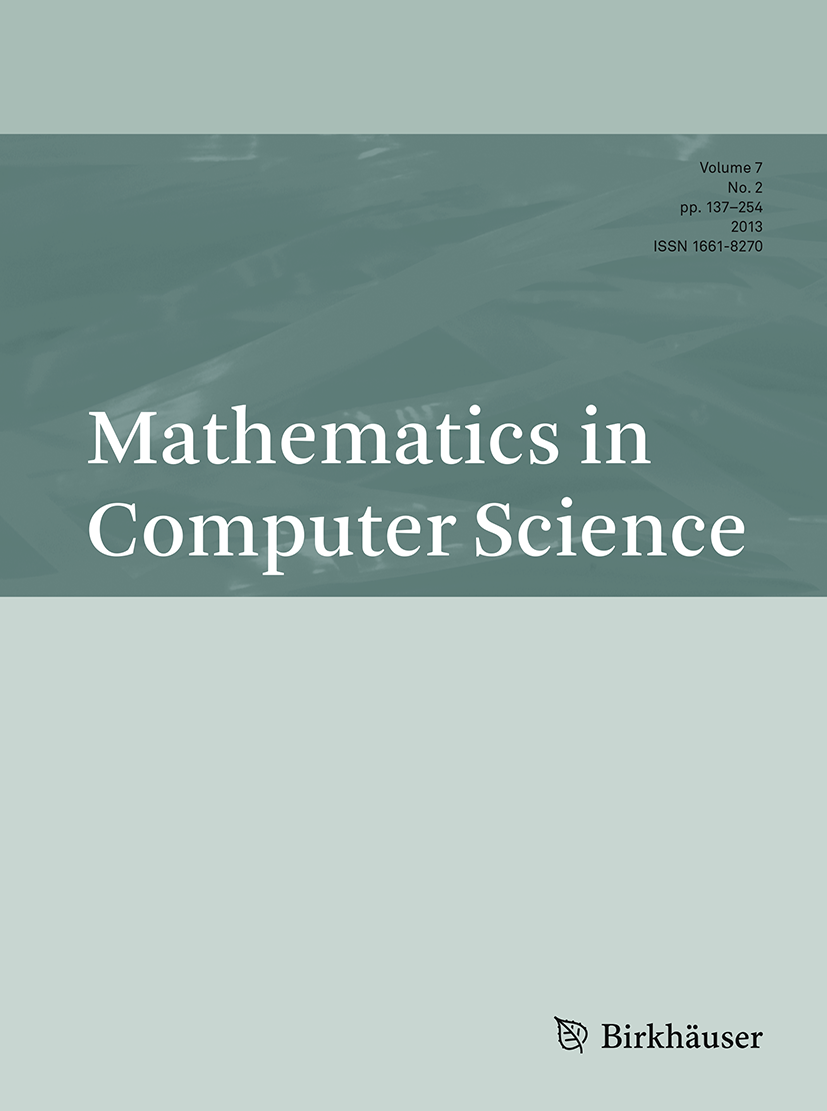
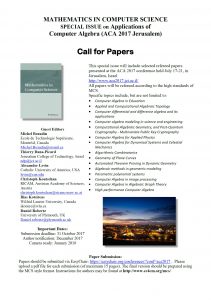
The conference will take place on the Lev Campus of Jerusalem College of Technology (Lev Academic Center).
The campus is located at 21, Havaad Haleumi Street, Jerusalem, in the Givat Mordechai area. It is close to the Begin Road and can be easily reached by public transportation.
Transportation: Bus: 5,6,9,39
Tramway: Shaare Tsedek Hospital station, then cross the road and take bus 39 to Givat Mordechai.
Taxis: they have a yellow sign on their roof with a registration number. You can stop a taxi on the street, or find taxi stations in every part of Jerusalem. Some companies have a mobile application (for example Gett).
For participants coming with a car, there is a parking lot at the entrance of the campus. On the campus, the parking facilities are quite limited. In the immediate neighbourhood of the workshop venue is a cafeteria open all day long. There are also vending machines at various places of the campus for snacks and refreshments.
lev campus new map
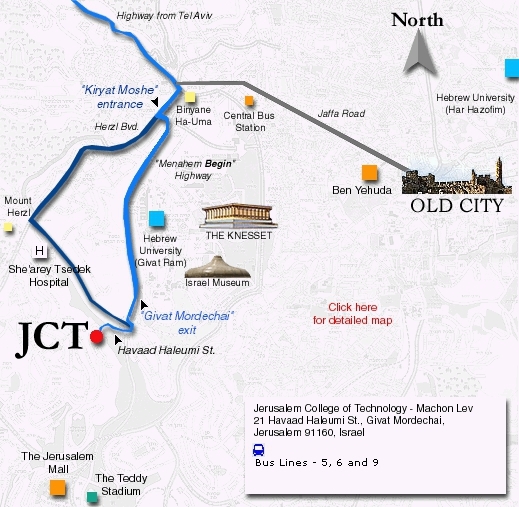
CONFERENCE EXCURSION
We are offering registered participants and registered accompanying persons a conference excursion to interesting places in Jerusalem,
The excursion is planned on Wednesday afternoon, July 19th. It is supported by the Authority for Jerusalem Development.
Buses will collect the participants from JCT Lev campus after lunch, to the City of David. There we will have an overview on 3000 years of history of the Holy City.
CONFERENCE DINNER
After the excursion, buses will take us to the Bayit Vegan area, across the street of Mount Hertzl. Participants who wish to have a short walk can enjoy the park there and a nice view over Jerusalem Hills.
The conference dinner will take place in the nice Social Hall of the Bayit Vegan Guest House.
Accommodation

There are numerous hotels, hostels, albergos, etc. in Jerusalem.
Here is a website where the hotels are classified according to various criteria: star number, location, etc.
Here are the areas we suggest you to choose:
-
Central Bus Station Mall (the central bus station is not in city center, this is a name for the intercity main bus station) (Tramway stop: Central Station)
-
West Jerusalem (probably the closest to the campus are listed there): Ramada, Jerusalem Gardens Hotel and Spa, Prima Park are on the same street (Vilani St.). Tramway stop: Kiryat Moshe (Ben Dor)
-
Jaffa Street area.
-
City Center (Tramway stop: Jaffa Center)
-
Machane Yehuda stop Market (Tramway: Mahane Yehuda)
The closest hotel is Rimonim Shalom. On foot, via a "trail", it takes 5-7 minutes to the campus. With a taxi, it takes 5-8 minutes.
1-2: From there you arrive to the campus entrance by bus no 6 (3 stops).
3-4-5: you arrive to the campus with bus 19 or with the Tramway (until stop Yefe Nof) and then bus 5, 39 (it will take about 25 minutes, depending on the period).
There are also good hotels close to Old City, but at a greater distance from the campus. Tramway stops: Shivtei Israel, Shimon Hatsadik.
The black arrow shows the direction to the campus.
Some hotels are listed in more than one area, as these areas are not disconnected open sets.
Of course you may use the classical sites such as booking.com, trivago.com, hotels.com, etc. The first one has a special subsite for cheap hotels in Jerusalem.
Jonatan Borwein ז"ל
Very few mathematicians manage to transcend the boundaries of more than one mathematical discipline and make substantial contributions to several areas of Mathematics. Jon was undeniably one of them. He was a paragon of Experimental Mathematics, Symbolic Computation, Functional Analysis, Optimization and other areas. His research work has already inspired thousands of individual researchers and will remain as a testament to this generation and to the coming ones.
